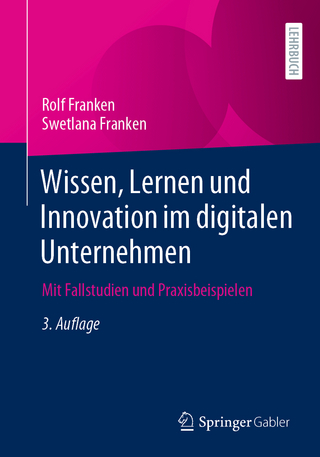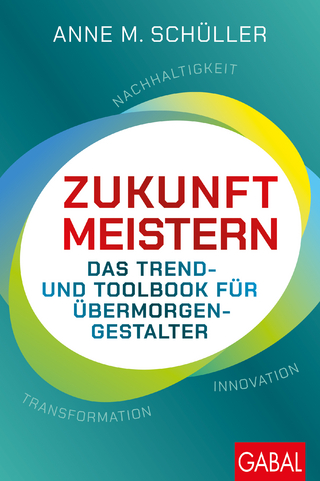
Knowledge and Discourse Matters
John Wiley & Sons Inc (Verlag)
978-1-118-93185-1 (ISBN)
The aim of this book is to explore and show how the phenomena of trust, risk and identity, as contexts constructed by speakers themselves, influence and mediate knowledge sharing in organizational encounters. The research particularly reveals how tacit knowledge (knowing), affects the scope and directions of everyday conversation. The first part of the book presents a comprehensive critical appraisal and analysis of the field of organizational knowledge management, followed by an introduction to the theory and methodology of discourse analysis, and a view of tacit knowing drawn from studies in implicit learning. The second part reports the detailed analysis and findings of original field research, investigating how participants in regular organizational meetings, including a discussion forum, manage the business of sharing knowledge. From the perspective of the research methodology, drawing on Discursive Psychology, knowledge is approached as an accomplishment in social interaction, with talk and text shown to be constructive, functional and action-oriented.
Presents a rigorous, evidence-based approach to Knowledge Management using original research
Approaches discourse as the location of knowledge work, and the site to which knowledge management practice should be focused
Positions the actions of knowledge work in everyday talk and text, thus giving practitioners a ready toolset to improve their strategies, practices and understanding of knowledge within organizations
Knowledge and Discourse Matters: Relocating Knowledge Management’s Sphere of Interest onto Language is a great reference for organizational leaders, knowledge managers, and human resource managers.
Dr. Lesley Crane is an independent consultant specializing in knowledge management, and technology supported learning for adults (e-learning). Much of her consultancy work involves providing strategic advice and research on the effective use of e-content, e-tools and the use of new technologies in the delivery of teaching and learning. Prior to working as a consultant, Lesley was Managing Director of her own SME business specializing in creative e-learning design and development for public and private sector organizations.
Dr. Lesley Crane is an independent consultant specializing in knowledge management, and technology supported learning for adults (e-learning). Much of her consultancy work involves providing strategic advice and research on the effective use of e-content, e-tools and the use of new technologies in the delivery of teaching and learning. Prior to working as a consultant, Lesley was Managing Director of her own SME business specializing in creative e-learning design and development for public and private sector organizations.
List of Figures and Tables xv
Foreword xvii
Acknowledgments xxiii
Introduction 1
PART ONE 7
1 The Nature of Knowledge 9
1.1 Knowledge: The Most Precious Asset and the Greatest Challenge 9
1.2 Why an Understanding of the Nature of Knowledge is Crucial 10
1.3 Ways of Defining Knowledge and the Rise of a Single Perspective 12
1.3.1 Knowledge: “Thing” or “Action”? 13
1.3.2 The Subjective versus Objective 14
1.3.3 Organizational versus Personal Knowledge 16
1.4 The Tacit–Explicit Conundrum 16
1.4.1 What Did Polanyi Really Say? 18
1.4.2 The Importance of Context: What Context and Whose Context? 19
1.4.3 A Preference for “Knowing” as Action 21
1.5 Frameworks of Meaning 22
1.6 A Hierarchy of Knowledge 23
1.7 Summary and Conclusions 24
Further Reading 25
2 The Constitution of Knowledge Management 27
2.1 Addressing Some Key Questions 27
2.2 The Origins of Knowledge Management 28
2.3 Multiple Perspectives and Limitless Boundaries 29
2.3.1 The Organization as a Body of Knowledge 30
2.3.2 Gulf between Practice and Academia 30
2.3.3 Knowledge Management from the Perspective of the Learning Organization 30
2.3.4 The Systemic Approach and Connections to Social Interaction 31
2.4 Is it a Passing Management Fad? 31
2.5 Technology as a Defining “Push Factor” 32
2.6 Should Knowledge be Managed? 34
2.7 Summary and Conclusions 35
Further Reading 36
3 Key Issues and Debates 37
3.1 Introduction 37
3.2 The Commodification and Reification of Knowledge 38
3.3 Determining Success or Failure 39
3.4 Measuring Knowledge Management Outcomes 41
3.5 Knowledge Management and Culture 42
3.6 Creating New Knowledge 43
3.7 Sharing Knowledge 45
3.8 Summary and Conclusions 48
Further Reading 50
4 Knowledge Management’s Theories 53
4.1 Finding Some New Directions 53
4.2 What Constitutes a Theory? 55
4.3 An Approach to Knowledge Management’s Theories: A Novel Taxonomy 56
4.4 The Personal versus Organizational Knowledge Question 60
4.5 The Personal versus Organizational Knowledge on the Social Action Axis 62
4.5.1 Personal Knowledge as the Unit of Analysis 62
4.5.2 Knowledge as Practice Contrasted with Knowledge as Possession 63
4.5.3 Connecting the “Organizational” with the “Personal”: Social, Situated, and Constructed 64
4.5.4 Knowledge, Activity Theory, and Activity Systems 65
4.5.5 The Phenomenological Perspective 66
4.5.6 “Know(ing) How” and “Know(ing) That” and Communities of Practice 67
4.5.7 Creative Abrasion 68
4.6 Reification of Knowledge: One Paradigm Dominates 69
4.6.1 “The Theory” and the Theorist as Bricoleur 69
4.6.2 Shuffling Ideas 71
4.6.3 Misinterpretation and Misrepresentation 71
4.6.4 More Troubling Observations on the Theory of the Knowledge]Creating Firm 73
4.7 Roundup of Some Other Perspectives in the “Knowledge as Object” Spectrum 74
4.8 The Issues Over the Inductionist Foundation of Theory 75
4.9 Summary and Conclusions 76
Further Reading 78
5 Social Constructionism and the Constructionist View of Knowledge 79
5.1 Introduction 79
5.2 Social Constructionism as a Way of Looking at the World 80
5.3 Simply Extending Existing Directions 81
5.4 The Social Constructionist View of Knowledge 83
5.5 The Debate Over Method 84
5.6 On Objectivity 86
5.7 Summary and Conclusions 87
Further Reading 88
6 Discourse as the Site of Knowledge Work 89
6.1 Introduction and the Turn to Talk 89
6.2 Introducing Discursive Psychology 91
6.2.1 Origins 91
6.2.2 Discursive Psychology’s Core Assumptions 91
6.2.3 Emerging Ideas 92
6.2.4 The Thorny Issue of Variation 93
6.3 Other Leading Paradigms in Discourse Analysis 94
6.3.1 Critical Discourse Analysis 94
6.3.2 Conversation Analysis 95
6.3.3 Membership Categorization Analysis 96
6.4 Topics of Study in Discourse Analysis 96
6.4.1 Discourse and Identity 97
6.4.2 Discourse and Gender 101
6.4.3 Discourse and Computer Mediated Communications 103
6.5 Sensemaking 107
6.6 Summary and Conclusions 109
Further Reading 110
7 The Implicit Formulation of Tacit Knowing and Resolving Matters of Relevance 113
7.1 Introduction: Questions and Connections 113
7.2 The Origins of the “Tacit Question” 115
7.3 The Values of Tacit Knowledge 117
7.4 A Disputed Phenomenon 118
7.5 Knowledge Management’s “Implicit Formulation” of Tacit Knowledge 119
7.6 The Implicit Learning Paradigm 120
7.6.1 The “Polanyi Connection” 121
7.6.2 The Challenge of Researching the Unspeakable: Research Paradigms in Implicit Learning 122
7.6.3 Unconscious and Natural 123
7.6.4 An Abstractionist Model 124
7.6.5 Automaticity and Influence 125
7.6.6 An Ancient Evolved System 126
7.6.7 Some Spanners in the Implicit Learning Theory Works 126
7.7 Comparing Knowledge Management’s Perspectives on the Tacit with the IL Formulation 128
7.8 Philosophy, Methodology, and Incommensurability 128
7.8.1 A Divergence of Approach 130
7.8.2 Reconciling Two Opposing Fields 131
7.9 Summary and Conclusions 132
Further Reading 134
8 Thematic Categories of Knowledge Sharing 135
8.1 Introduction 135
8.2 Identity 136
8.3 Trust 137
8.4 Risk 138
8.5 Context 139
8.6 A Final Problem to Resolve 140
8.7 Summary 141
Further Reading 141
9 The Case for Discourse as the Priority 143
9.1 Knowledge and Discourse Matters: Summarizing the Case 143
9.2 Changes in Direction? 146
9.3 Making it Work: Implications and Contributions 147
9.4 Conclusions 148
PART TWO 151
10 Introduction to Part Two 153
11 Methodology 155
11.1 Introduction 155
11.2 Locating the Present Study 156
11.3 A Brief Digress into the Positivist Account of Science 158
11.4 Research Method 159
11.4.1 An Explanation of the Method 159
11.4.2 Grounds for Criticism and the Issue of Measuring Quality 161
11.5 Research Design 163
11.5.1 Design 163
11.5.2 Research Data 168
11.5.3 Participants and Ethical Considerations 169
11.6 Points of Limitation 171
11.7 Summary and Indicative Research Questions 172
Further Reading 172
12 Trust as an Artifact of Knowledge Sharing 173
12.1 The Importance of Trust 173
12.2 Data 175
12.3 Casting the Characters and Setting the Scene for Action 176
12.4 Working up Trust Through Epistemic Superiority and Authenticity 178
12.4.1 Emerging Challenge 178
12.4.2 Competing Strategies for Conjuring Trust 180
12.4.3 Avoiding Direct Challenge by Reformulating the Problem 181
12.5 Risk and Competence as Contingent Factors to Trust 182
12.5.1 Calling on Witnesses to Work Up Persuasion 182
12.5.2 Two Competing Versions of the Same Witness Accounts 185
12.5.3 Issuing Challenges to Competency and Undermining Trust 185
12.6 Trust Breakdown Connects with Knowledge Sharing Breaches 186
12.6.1 Factual Accounting as a Warrant for Trust 186
12.6.2 A Breach in Knowledge Sharing Comes to the Fore 188
12.7 Knowledge, Trust, and Blame 189
12.7.1 Issuing the Call to Account 189
12.7.2 Managing Blame 191
12.7.3 Question over Competence or Simply not Sharing Knowledge? 191
12.8 Preliminary Reflections 193
Further Reading 194
13 Knowledge Sharing is a Risky Business 195
13.1 The Risky Business of Sharing Knowledge 195
13.2 Sequential and Rhetorical Organization: Group Norms and Reputation 196
13.3 High Stakes and Truth Telling 200
13.3.1 Stake and Authenticity 201
13.3.2 Authenticity and Challenge 202
13.3.3 Narrative and Consensus–Corroboration 206
13.4 Doing “Uber Authenticity” Through Vivid Narrative Accounting 209
13.4.1 Issuing a News Headline 209
13.4.2 Doing Being Ordinary 211
13.4.3 Whose Counting? Quantitative Accounting 213
13.5 Preliminary Reflections 214
Further Reading 216
14 Negotiating Positions of Authority 219
14.1 Knowledge Sharing Accomplished from a Subject Position 219
14.2 Context, Participants, and Expectations 221
14.3 Problems, Complexities, and Appeals to Common Sense 221
14.3.1 Invoking Positions of Authority 223
14.3.2 Formulating a Script for the Client 226
14.3.3 Influencing Effects of “the Script” 228
14.4 “Seasoned Exhibitionists” and Bombshells 229
14.4.1 Shifting the Position of Authority 230
14.4.2 Issuing a Bombshell and Working to Save Face 231
14.5 Preliminary Reflections 233
Further Reading 234
15 Building Identities as Expert in an Online Forum 235
15.1 Introduction 235
15.2 Data 235
15.3 The Trigger: More than a Request for Advice 236
15.4 Constructing “In]Groups” as Markers of Expert Status 237
15.5 Positioning and Group Membership 239
15.6 In]Group Rivalry 240
15.7 Consensus Patterns 242
15.8 Claims to Privileged Knowledge 243
15.8.1 Listing 244
15.8.2 Metaphors 244
15.9 Preliminary Reflections 245
Further Reading 246
16 On Matters of Context 247
16.1 The Importance of Contextual Particulars 247
16.2 Data 249
16.3 Shared Understanding 249
16.3.1 Displaying Knowing What’s on Others’ Minds 250
16.3.2 Gisting and Elaboration 252
16.4 Stance]Taking 255
16.4.1 Invoking the Context of Courtroom 255
16.4.2 Doing “them and us” 258
16.5 Doing Historicity 260
16.6 Preliminary Reflections 263
Postscript 264
Further Reading 264
17 Finding Meaning, Implications, and Future Directions 265
17.1 A Management Practice in Search of an Object 265
17.2 Finding Meaning 267
17.2.1 Constructing Live Issues and Concerns 267
17.2.2 Influencing Knowledge Sharing 271
17.2.3 The Corelational Nature of Invoked Concerns 274
17.2.4 A Tacit Accomplishment 276
17.3 Relating the Findings to Debates and Issues in Knowledge Management 278
17.3.1 The Central Concern of Knowledge Management with “How” and “What” 278
17.3.2 The “Relevance” Issue Concerning Discursive Psychology 279
17.3.3 A Theory of Language 280
17.3.4 A Different Conceptualization of Knowledge Sharing 280
17.3.5 A Different Approach to Core Issues in Knowledge Management 281
17.4 Future Directions 282
Appendix 285
Index to Glossary Terms 289
Bibliography 291
Subject Index 305
| Erscheint lt. Verlag | 4.12.2015 |
|---|---|
| Verlagsort | New York |
| Sprache | englisch |
| Maße | 163 x 236 mm |
| Gewicht | 544 g |
| Themenwelt | Mathematik / Informatik ► Mathematik |
| Technik ► Elektrotechnik / Energietechnik | |
| Wirtschaft ► Betriebswirtschaft / Management ► Unternehmensführung / Management | |
| ISBN-10 | 1-118-93185-8 / 1118931858 |
| ISBN-13 | 978-1-118-93185-1 / 9781118931851 |
| Zustand | Neuware |
| Informationen gemäß Produktsicherheitsverordnung (GPSR) | |
| Haben Sie eine Frage zum Produkt? |
aus dem Bereich


